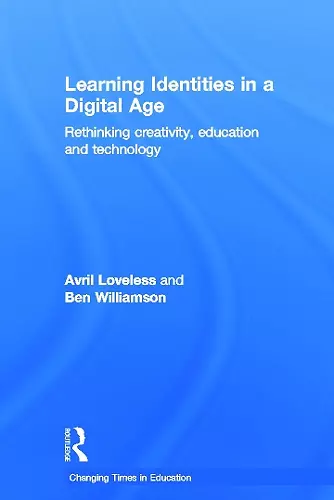Learning Identities in a Digital Age
Rethinking creativity, education and technology
Avril Loveless author Ben Williamson author
Format:Hardback
Publisher:Taylor & Francis Ltd
Published:28th Feb '13
Currently unavailable, and unfortunately no date known when it will be back
This hardback is available in another edition too:
- Paperback£48.99(9780415675727)

Digital media are increasingly interwoven into how we understand society and ourselves today. From lines of code to evolving forms of online conduct, they have become an ever-present layer of our age. The rethinking of education has now become the subject of intense global policy debates and academic research, paralleled by the invention and promotion of new learning identities, which are intended to incite teachers and students to think, feel, and act as social operators in schools and beyond.
Learning Identities in a Digital Age provides a critical exploration of how education has been reimagined for the digital future. It argues that education is now the subject of a "cybernetic" mode of thought: a contemporary style of thinking about society and identity that is saturated with metaphors of networks, flexibility, interactivity, and connectedness. This book examines how shifts in thought have translated into fresh ideas about creative learning, interactive tools, curriculum reform, and teacher identity. The text identifies how learning identities have been promoted, and position young people as networked learners, equipped for political, economic and cultural participation in the digital age.
Included in the text:
- mapping the digital age
- reconstructing the future of education
-making up digital learning identities
-assembling creative learning
-thinking with digital tools
- protoyping the curriculum of the future
-being a teacher in a digital age.
This book situates education and technology in an intergenerational and interdisciplinary conversation. It will be of interest to students, researchers and practising education professionals who want to understand the wider sociological and psychological significance of new technologies on education and learner identity.
"This book works on several different levels. It’s an enlightening introduction to, and application of, recent (broadly postmodern) theory, which should be of interest to a readership well beyond the field of new technology. It exemplifies a critically reflexive research approach. It’s a genealogy of how we have come to view the so-called digital age and an exploration of what these perspectives mean for teachers, students and pedagogies. And finally, it enacts intellectual collaboration and dialogue within its pages between different disciplines, research approaches and theoretical orientations."—Sara Bragg, Research in Education
ISBN: 9780415675710
Dimensions: unknown
Weight: 620g
208 pages